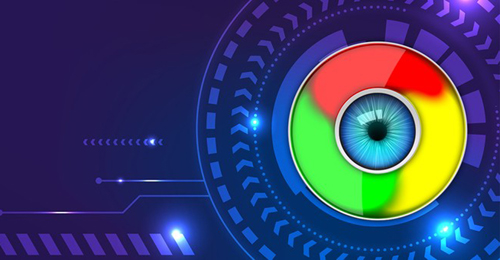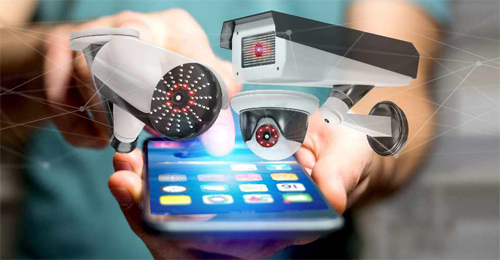Edward Snowden Explains How Your Cellphone Has Become an Undercover Surveillance Device
By now, it should be crystal clear to anyone paying attention that individual autonomy and freedom is under attack by powerful forces with the capability to shape and mold society according to their own whims.

Tech monopolies like Google and Facebook have accumulated the power to erase your civil liberties, often without you even noticing it happening, even though it’s occurring right in front of your face, or in this case, right on your computer or cellphone screen.
Over the years, Google became the biggest “library” in the history of the world. While it began as an inconceivable blessing, giving people access to information they might never have had access to before, it has since morphed into a massive, and just as inconceivable, control device.
As of June 2019, Google has changed the game, and you are no longer able to access this vast treasure-trove of information in the same way you were able to in the past.
The results can be nothing short of devastating, as you’re not only prevented from finding truthful information about health (among other things), but you’re actively being led toward information that will mislead you. So, it’s a double whammy.
Joe Rogan interviewed Edward Snowden, it’s a nearly three-hour-long interview. It may well be one of the best interviews Snowden has ever given.
Who Is Edward Snowden?
Snowden became a household name in the summer of 2013, when he came forward as the source of leaked classified National Security Agency (NSA) documents proving the existence of programs designed to spy on the American (and international) public.
Snowden, a high-ranking security technologist and former employee of the U.S. Central Intelligence Agency, was working as a tech specialist with Booz Allen Hamilton, a consulting firm and defense contractor.
In that capacity, he’d been contracted to perform work for the NSA at a facility in Hawaii. Over the course of his four-year stint with the NSA, he learned about these secret surveillance programs.
At great personal sacrifice, Snowden ended up leaking a cache of documents showing the extreme extent to which the public was (and still is) being surveilled. The leaked documents made their way into news stories published in The Washington Post and the Guardian, among others.
In a note attached to the first document leaked to The Washington Post, Snowden said his sole motive for disclosing the information was “to inform the public as to that which is done in their name and that which is done against them.”
Snowden — The People’s Hero
While some (especially those in the intelligence community) regard him as a traitor of the worst kind, others see him as a patriot and a hero. Without doubt, he’s one of the most important whistleblowers in modern history.
Snowden sacrificed everything to make us aware of the illegal, immoral and largely unnecessary surveillance taking place. As reported by The Guardian in 2013:
“He has had ‘a very comfortable life’ that included a salary of roughly $200,000, a girlfriend with whom he shared a home in Hawaii, a stable career, and a family he loves.”
“‘I’m willing to sacrifice all of that because I can’t in good conscience allow the U.S. government to destroy privacy, internet freedom and basic liberties for people around the world with this massive surveillance machine they’re secretly building.’”
Snowden initially fled from Hawaii to Hong Kong to evade capture. He was eventually granted asylum in Russia after being stranded at the Moscow airport transit zone for a month. U.S. authorities annulled his passport, which prevented him from going anywhere, but the transit zone is also, technically, not Russian soil, so he couldn’t be extradited.
Snowden lives in Russia to this day and, so far, all extradition efforts have failed. This situation, which has strained relations between the U.S. and Russia, is likely one reason why Russia has been chronically painted as a political enemy in recent years.
Snowden recently released his first book, Permanent Record, in which he details not only his life but also his views on the shift of power, and how technology plays a role in that shift.

Is Global Surveillance Legal?
In his interview with Rogan, Snowden addresses the common misconception that the global, technological surveillance programs he uncovered is no big deal because, well, isn’t that what intelligence agencies are supposed to do?
The answer, he says, is no, they’re not supposed to spy on lawful citizens. Under law, the U.S. government is only allowed to surveil or spy on an individual if they have actual cause to do so, meaning there’s a suspicion that a particular individual is engaged in illegal activity or activity that threatens national security or public safety.
In other words, they have to get a warrant before they can access your private records, be it phone calls, emails, photos, travel itineraries or the like. Snowden goes on to recount the history of how this legal framework changed — which all happened in secret.
The first surveillance program was known as Stellar Wind, which was basically a program to surveil all phone calls and internet communications, globally, ostensibly to look for people with links to al-Qaida. “They started doing this in secret and it was completely unconstitutional, completely illegal,” Snowden says.
“Step by step by step, our constitutional rights were changed. And we weren’t allowed to know it … We, the American people, had sort of lost our seat at the table of the government. We were no longer partner to government; we had become subject to government.”
Indeed, over the years, we’ve seen a shift where it doesn’t seem to matter what the people want anymore. Those in government are just doing what they want, regardless of the weight of the objections.
The mandating of vaccines is perhaps a perfect example of this. Thousands of people can show up to object at public hearings, yet their objections fall on deaf ears. Obviously, we cannot change a system if we don’t understand how the system works, or that it even exists, and this is why Snowden decided to go public with what he’d found.
Now, one of the tech platforms that facilitates the implementation of all this surveillance is, you guessed it, Google. Google performs an invaluable service by tracking and indefinitely storing every single keystroke you’ve ever made.
How Your Cellphone Spies on You
If the three-hour interview is too much to handle, at least watch this 20-minute outtake from Rogan’s interview with Snowden. In it, he specifically discusses how your cellphone has become an undercover surveillance device.
At all times, your phone is connected to the nearest cellphone tower, and it’s continuously broadcasting a globally unique identifier code that identifies your physical handset. This is why when someone calls your number, your phone rings and no one else’s.
Each cell tower your phone connects to makes a permanent record of your handset and phone number, and the time that it was connected to that particular tower.
Since you have to have a service subscription for your phone number, once someone has your handset ID and corresponding phone number, they can obtain your identity. So, as you move about your day, your phone is tracking your every move, provided it’s on your person.
As noted by Snowden, there is no need for this information to be kept forever, and yet it is. Companies see this data as valuable information, providing them with data points about you, your interests, personal connections and so on, which is then turned into a gigantic profile of you as a person that can be exploited in various ways, including for marketing purposes.
Snowden also explains how, even if you have GPS turned off in your phone, as long as you’re connected to Wi-Fi, your exact location is still being identified and recorded, thanks to globally unique identifiers in Wi-Fi modems. In other words, Wi-Fi access points act as proxies for your location even in the absence of GPS data.
The book The Government Does Not Want You to Read (Permanent Record by Edward Snowden), went #1 in the World.
How Can You Protect Your Privacy?
So, what can you do to protect your privacy? As strange as it sounds, even shutting your cellphone off isn’t a guaranteed shield from this kind of surveillance, as shutting it off might not entirely shut it off.

The reason for this is because most smartphones now have permanent batteries, and if you cannot remove the battery, you cannot be certain that no data are being received or transmitted from the device.
According to Snowden, “There are ways to hack a phone to where it appears to be off but it’s not actually off, it’s just ‘pretending’ to be off.” If you want to learn more about this, see Snowden’s paper “Against the Law: Countering Lawful Abuses of Digital Surveillance,” published in The Journal of Open Engineering.
For the average person, though, such hacking will not take place and shouldn’t be of great concern. Snowden’s paper addresses the problem of cellphone surveillance from the point of view of how it can sabotage and threaten the safety of journalists, who may be actively targeted.
Snowden recommends that when considering mitigation efforts, first consider just how damaging the information might be to you were it to be exploited. So, in other words, don’t send “top-secret” documents from your cellphone, for example.
The primary threat to the average citizen is the bulk collection of data, Snowden says, which is made possible by the fact that most people leave their phones on all the time.
“The central problem with smartphone use today is you have no idea what the hell it’s doing,” he says. “You don’t know what it’s connected to or how frequently it’s [sending/receiving information]. Apple and IOS make it impossible to see what kind of network connections are constantly made on the device.”
Privacy Requires the Ability to Control Your Data
What we need is the ability to make decisions about which apps and programs are able to communicate and when, Snowden says. Part of the problem is the fact that there’s an entire industry built on keeping all of this invisible, to keep you in the dark about what data are being collected on you and when.
“We need to make the activity of our devices … more visible and understandable to the average person,” he says. “And then give control over it.” Google and Apple are not providing this capability, claiming it’s simply too complex a task, and that, Snowden says, “is actually a confession of the problem.”
“If you think people can’t understand it, if you think there are too many communications happening, you think there’s too much complexity in there, [then] it needs to be simplified,” Snowden says. “It should be a much more simple process.”
“It should be obvious, and the fact that it’s not; the fact that we read story after story … saying your data has been breached here, this company is spying on you… this company is manipulating your purchases or your search results, or they’re hiding these things from your timeline, or they’re influencing or manipulating you in all these different ways — that happens as a result of a single problem, and that problem is an inequality of available information.
They can see everything about you, they can see everything about what your device is doing and they can do whatever they want with your device. You on the other hand … you paid for the device, but increasingly these corporations own it; increasingly government owns it …
We are living in a world where we do all the work, we pay all the taxes, we pay all the costs, but we own less and less … This is something people don’t get — they go ‘oh it’s data collection; they’re exploiting data.’ This is data about human lives. It is data about people.
These records are about you. It’s not data being exploited, it’s people that are being exploited. It’s not data that’s being manipulated, it’s YOU that’s being manipulated!”
Google Is Too Big for Our Own Good
Google worked for many years to earn your trust, but it was really just setting a trap to twist that trust into powerful control. It started out giving you everything you wanted, so it can now take everything you have.
Google now has a stranglehold on information, picking and choosing what it wants you to be able to see and what you cannot. It also plays an integral role in the mass surveillance machine, as it’s a primary collector of personal data.
For an in-depth look at how Google is censoring health and political information, read “Google Whistleblower Zach Vorhies Speaks Out.” In many ways, Vorhies is the Snowden of Google, ripping the veil to reveal the many ways in which Google is manipulating users and influencing politics from behind the scenes.
If you can, watch Rogan’s interview with Snowden in its entirety. You’re not likely to regret it, as it’s really, really informative. Even though there are few answers to the surveillance problem at present, we’ll never find any answers if we remain unaware of how the surveillance works, or that it’s even taking place.
Aside from turning your phone off when not in use, to minimize the tracking of your every move, eliminating Google and Facebook from your life is another way you can protect your privacy.
It’s time to boycott Google and avoid using any and all Google products.
Here are a few suggestions:
• Stop using Google search engines. Just try out DuckDuckGo.com
• If you have an Android phone consider ditching it (as it is a Google operating system) and switch to an iPhone, which is more diligent about preserving your privacy.
• Uninstall Google Chrome (or Mozilla Firefox for that matter) and use Vivaldi or Opera browser instead, available for all computers and mobile devices. From a security perspective, Opera is far superior to Chrome and offers a free VPN service (virtual private network) to further preserve your privacy.
• If you have a Gmail account, try a non-Google email service such as ProtonMail, an encrypted email service based in Switzerland.
• Stop using Google docs.
• If you’re a high school student, do not convert the Google accounts you created as a student into personal accounts.
yogaesoteric
June 20, 2020
